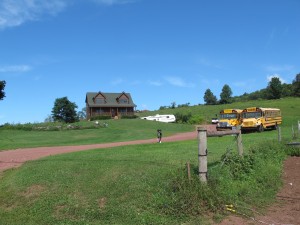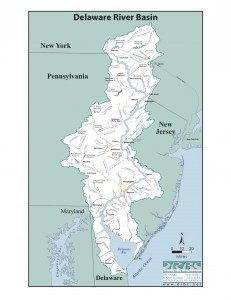Politicians may not be in a hurry to break drilling deadlock in the Delaware watershed
-
Katie Colaneri

Katie Colaneri/StateImpact Pennsylvania
Wayne County Commissioner Brian Smith leased his farm to an energy company, but has not seen any natural gas production on his land.
Dairy farming doesn’t bring in the money it used to in Wayne County, Pennsylvania. So to make ends meet, farmer Brian Smith is also a school bus driver and a county commissioner.
A few years ago, Smith leased his land in Damascus Township to an energy company looking to tap into deposits of natural gas in the Marcellus Shale below his farm.
Smith said he wanted some financial security for his family of eight. “You start thinking as you turn 50 years old, if something happens to me, how are these kids gonna pay $300,000 to pay off the debt that’s on this farm?”
But in the parts of Pennsylvania that lie in the Delaware River watershed, natural gas drilling has been on hold for more than four years. That’s because the five-member Delaware River Basin Commission, the agency in charge of overseeing the region’s water quality, has been unable to come to a consensus about how to regulate it. The DRBC came close to voting on draft regulations in late November 2011, but the meeting was postponed indefinitely to give the commissioners more time.
For the last two years, Pennsylvania Governor Tom Corbett has been the commission’s only vocal “yes” vote. The other commissioners – the governors of New Jersey, New York and Delaware, plus a federal representative from the Army Corps of Engineers – haven’t taken a final stand.

Katie Colaneri/StateImpact Pennsylvania
Brian Smith’s dairy farm in Damascus Township, Wayne County. Smith also works as a county commissioner and a school bus driver.
Rural vs. urban influence
Smith blamed the delay on the influence of people living more than one hundred miles away in Philadelphia and New York City.
“It’s a popular side of the argument to say we want clean water,” Smith said. “It’s an unpopular side of the argument to say we also need to have energy and we also need to move forward with some production of natural gas.”
But environmentalists across the region have continued lobbying to keep the moratorium on drilling in the Delaware watershed.
“It’s helped create a national movement,” said Jeff Tittel, Director of the New Jersey chapter of the Sierra Club. “It’s wakened people in two of the most activist regions in the country.”
The Delaware River and its tributaries provide fresh drinking water for about 15 million people in the four states that make up the watershed. Environmentalists such as Tittel worry the heavy industrial activity that comes with natural gas development will ruin the water supply. So he always has his finger to the wind.
“Our biggest hope will be that Pennsylvania gets a new governor and we can hold things out until that new governor’s in office and we can buy some time to either keep the moratorium going or get regulations that will be strict enough to make sure that if fracking happens, that it’s not going to have the devastating impacts,” Tittel said.
The role of the White House
While it may not be to Governor Corbett’s advantage to wait, it could benefit his fellow commissioners.
Peter Kostmayer has been around the politics of water for a long time. He now works as a CEO for a nonprofit in New York City, but was Bucks County’s democratic congressman for seven terms. A former EPA administrator, he was also part of the fight in the 1970s to include the Delaware in the National Wild and Scenic Rivers System.
If the governors split along party lines – two Republicans and two Democrats – Kostmayer said the Obama administration may have to break the tie.
So far, Obama has seemed reluctant to weigh in. The President supports natural gas development to bring down greenhouse gas emissions, but he has also needed the political support of environmentalists who want to limit use of fossil fuels.
“He may say look, I know environmentalists are opposed to this, but it’s an important piece of our alternative energy project and if we’re going to reduce the amount of oil we’re bringing into this country, we’ve got to find some alternatives. We can’t say no to everything,” Kostmayer said.
In the meantime, Pennsylvania is advocating for natural gas development. Governor Corbett’s Energy Executive, Patrick Henderson, notes Pennsylvania is the only state on the commission to have experience with active drilling.
“There’s a very compelling argument to make that even though there was a comfort level which we thought was there in late 2011, we’ve again done nothing but strengthen environmental standards here in Pennsylvania,” Henderson told StateImpact Pennsylvania in a recent interview.
Holding out for ‘the gold standard’
Not everyone is convinced. If drilling gets approved in the Delaware watershed, the first rigs will most likely be in Pennsylvania. So the other states need to be confident that drilling won’t compromise water quality for their residents.
The commissioners are still hashing out which regulatory tasks will be handled by the DRBC, and which by the states. For example, the state Department of Environmental Protection has more experience regulating well casings. But will other states be comfortable with the way Pennsylvania handles that?
As the debate continues, Pennsylvania is getting impatient. Over the summer, U.S. Senator Pat Toomey and Governor Corbett vented frustration in letters to the DRBC. A group of landowners in Wayne County have threatened to sue the commission over the delay.
Delaware Secretary of Environment and Energy Collin O’Mara told StateImpact Pennsylvania it’s not a political standoff.
“Our belief is that there are best practices,” O’Mara said. “You can really reduce the risks and potential impacts and still have access to a lower cost and lower emission source of energy.”
O’Mara insists the commissioners just want to get it right.
“There is an opportunity for us to have a consensus that could really become the gold standard for the country,” O’Mara said.

http://www.state.nj.us/drbc/basin/map/
A map of the Delaware River Basin.//www.state.nj.us/drbc/basin/map/
Since it was founded in 1961, the commission’s goal has been to get the four states to see the big picture. DRBC spokesman Clarke Rupert said watersheds don’t have political boundaries.
“With the watershed concept, everything is connected, so actions that take place in the upper watershed can have an impact on those who live downstream,” Rupert said.
Former Congressman Peter Kostmayer agrees with that to a point.
“But where he’s wrong is politics is always here,” Kostmayer said. “Politics is a part of this process and there’s no point in trying to take it out. You have to make it work for you.”
The cost of indecision
If the DRBC does approve rules for natural gas drilling in the Delaware River watershed, that doesn’t mean the other three states will be forced to allow it within their borders. But the draft DRBC rules would impose tighter regulations than in other parts of Pennsylvania where drilling is going on.
Dairy Farmer Brian Smith thinks Wayne County may have already missed out on the natural gas boom.
“If and I hope they do have a positive vote to move forward with regulations that would allow it here, I don’t think they’re gonna move right in and say we’ll start drilling tomorrow,” Smith said.
That’s why Pennsylvania wants the DRBC to get a move on and why others are happy to let the stalemate linger.
















